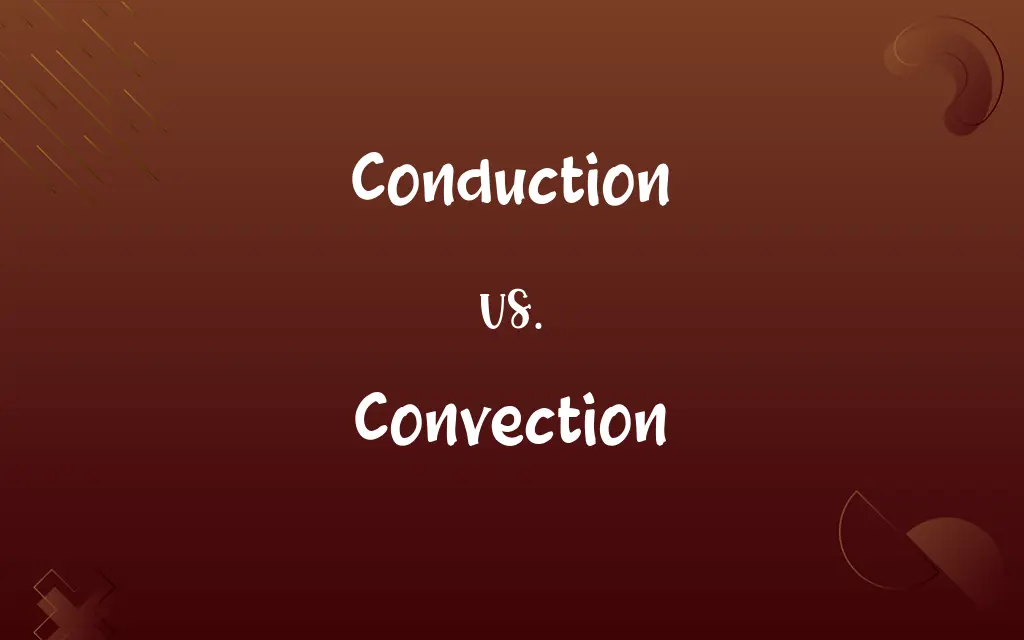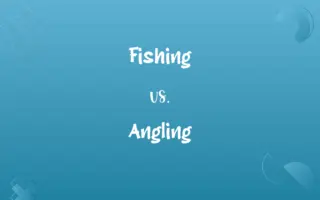Conduction vs. Convection: Know the Difference

By Shumaila Saeed || Updated on December 25, 2023
Conduction is heat transfer through direct contact between materials, while convection is heat transfer through fluid movement.

Key Differences
Conduction is the process where heat or electricity is directly transmitted through a substance when there is a difference of temperature or of electrical potential between adjoining regions, without movement of the material. Convection, on the other hand, is a mode of heat transfer by fluid motion, typically within a gas or liquid, where the warmer part of the mass will rise and the cooler portions will sink, leading to a circulation pattern.
Shumaila Saeed
Nov 24, 2023
While conduction requires direct contact between molecules, convection is reliant on the movement of molecules within fluids (liquids or gases) to transfer heat. Conduction is most effective in solids, where molecules are closely packed and can easily transfer energy to their neighbors. Convection is effective in fluids where, despite the molecules being more spread out, bulk movement can mix the fluid and distribute energy.
Shumaila Saeed
Nov 24, 2023
In conduction, the material itself does not move; only energy is transferred through the material. With convection, the energy is transferred by the physical movement of the fluid itself. Conduction can occur in solids, liquids, and gases, but it is most efficient in solids. Convection, however, only occurs in fluids where there is a capability for free movement.
Shumaila Saeed
Nov 24, 2023
The rate of conduction can be described by Fourier's law of heat conduction, which states that the time rate of heat transfer through a material is proportional to the negative gradient in the temperature and to the area, at right angles to that gradient, through which the heat is flowing. In contrast, convection is described by Newton's law of cooling, which states that the rate of heat loss of a body is directly proportional to the difference in temperatures between the body and its surroundings.
Shumaila Saeed
Nov 24, 2023
Conduction and convection also differ in how they can be influenced by external conditions. Conduction is mostly affected by the thermal conductivity of the material and the temperature gradient. Convection can be influenced by the fluid's temperature, its viscosity, and other properties, as well as by the shape and orientation of the object in the fluid and the presence of a gravitational field.
Shumaila Saeed
Nov 24, 2023
ADVERTISEMENT
Comparison Chart
ADVERTISEMENT
Conduction and Convection Definitions
Conduction
Transfer of heat through direct contact.
The pot's handle was hot due to conduction from the stove.
Shumaila Saeed
Nov 08, 2023
Convection
The process driving weather patterns due to heat transfer.
Convection causes thunderstorms when warm, moist air rises and cools.
Shumaila Saeed
Nov 08, 2023
Conduction
Transfer of energy within the body's tissues.
Conduction helps maintain the body's temperature.
Shumaila Saeed
Nov 08, 2023
Convection
Movement of heat in liquids and gases through current flow.
Boiling water demonstrates convection as the hot water rises and the cooler water descends.
Shumaila Saeed
Nov 08, 2023
Conduction
Process of conveying something such as heat or electricity.
Insulators are materials that resist thermal and electrical conduction.
Shumaila Saeed
Nov 08, 2023
ADVERTISEMENT
Convection
Transfer of heat by the circulation or movement of fluid.
The central heating system uses convection to warm the house.
Shumaila Saeed
Nov 08, 2023
Conduction
Process by which sound waves travel through a medium.
Sound conduction is faster in water than in air.
Shumaila Saeed
Nov 08, 2023
Convection
A method of heat transfer in astrophysical phenomena.
Convection in the sun's interior generates solar flares and sunspots.
Shumaila Saeed
Nov 08, 2023
Conduction
The transmission or conveying of something through a medium or passage, especially the transmission of electric charge or heat through a conducting medium without perceptible motion of the medium itself.
Shumaila Saeed
Nov 07, 2023
Conduction
(physics) The conveying of heat or electricity through material.
Shumaila Saeed
Nov 07, 2023
Convection
Heat transfer in a gas or liquid by the circulation of currents from one region to another.
Shumaila Saeed
Nov 07, 2023
Convection
(Meteorology)The transfer of heat or other atmospheric properties by massive motion within the atmosphere, especially by such motion directed upward.
Shumaila Saeed
Nov 07, 2023
Convection
(physics) The transmission of heat in a fluid by the circulation of currents.
Shumaila Saeed
Nov 07, 2023
Conduction
Transmission through, or by means of, a conductor; also, conductivity.
[The] communication [of heat] from one body to another when they are in contact, or through a homogenous body from particle to particle, constitutes conduction.
Shumaila Saeed
Nov 07, 2023
Convection
(meteorology) The vertical movement of heat and moisture, especially by updrafts and downdrafts in an unstable air mass. The terms convection and thunderstorm are often used interchangeably, although thunderstorms are only one form of convection. Towering cumulus clouds are visible forms of convection.
Shumaila Saeed
Nov 07, 2023
Conduction
Passage of electrical current through a conductor.
Copper wires are used for electrical conduction in homes.
Shumaila Saeed
Nov 08, 2023
Convection
A process of transfer or transmission, as of heat or electricity, by means of currents in liquids or gases, resulting from changes of temperature and other causes.
Liquids are generally heated by convection - when heat is applied from below.
Shumaila Saeed
Nov 07, 2023
Convection
The transfer of heat through a fluid (liquid or gas) caused by molecular motion
Shumaila Saeed
Nov 07, 2023
Convection
(meteorology) the vertical movement of heat or other properties by massive motion within the atmosphere
Shumaila Saeed
Nov 07, 2023
Convection
Mechanism for plate tectonics involving heat-driven movement.
Convection currents in the mantle drive the movement of the Earth's crust.
Shumaila Saeed
Nov 08, 2023
Repeatedly Asked Queries
What materials are good conductors?
Metals like copper and aluminum are good conductors of heat and electricity.
Shumaila Saeed
Nov 24, 2023
What is conduction?
Conduction is the transfer of heat or electricity through a substance without the movement of the material itself.
Shumaila Saeed
Nov 24, 2023
Can conduction occur in a vacuum?
No, conduction requires a medium to transfer heat through direct contact between molecules.
Shumaila Saeed
Nov 24, 2023
What is a convection current?
A convection current is the flow that transfers heat within a fluid, due to the movement caused by changes in temperature and density.
Shumaila Saeed
Nov 24, 2023
How does convection occur?
Convection occurs when a fluid's warmer parts rise and cooler parts sink, creating a heat transfer by fluid motion.
Shumaila Saeed
Nov 24, 2023
What is convection?
Convection is the transfer of heat by the movement of fluids (liquids or gases).
Shumaila Saeed
Nov 24, 2023
Is convection faster than conduction?
Generally, yes, because the movement of large masses of fluid can transfer heat quickly.
Shumaila Saeed
Nov 24, 2023
Do conduction and convection require a medium?
Conduction requires a solid medium, while convection requires fluids.
Shumaila Saeed
Nov 24, 2023
Can conduction happen in a vacuum?
No, conduction needs atoms in close proximity, which a vacuum lacks.
Shumaila Saeed
Nov 24, 2023
Can convection occur in solids?
No, convection is specific to fluids where movement can facilitate heat transfer.
Shumaila Saeed
Nov 24, 2023
How does temperature affect conduction?
Higher temperatures usually increase the rate of conduction in conductors.
Shumaila Saeed
Nov 24, 2023
Are conduction and convection methods of cooking?
Yes, they are both used in cooking—conduction through direct contact with heat, and convection by circulating hot air.
Shumaila Saeed
Nov 24, 2023
How does temperature affect convection?
Temperature differences drive convection currents, with warmer fluid rising and cooler fluid sinking.
Shumaila Saeed
Nov 24, 2023
Is insulation related to conduction?
Yes, insulators are materials that reduce heat transfer through conduction.
Shumaila Saeed
Nov 24, 2023
Do conduction and convection apply to electricity?
Conduction applies, as it's the flow of electrons through a conductor. Convection does not.
Shumaila Saeed
Nov 24, 2023
What's an example of conduction?
A metal spoon getting hot in a pot of boiling water.
Shumaila Saeed
Nov 24, 2023
What's an example of convection?
Warm air rising and cool air sinking in a room.
Shumaila Saeed
Nov 24, 2023
Does convection only occur naturally?
Convection can be natural or forced, like with a fan or pump.
Shumaila Saeed
Nov 24, 2023
Share this page
Link for your blog / website
HTML
Link to share via messenger
About Author
Written by
Shumaila SaeedShumaila Saeed, an expert content creator with 6 years of experience, specializes in distilling complex topics into easily digestible comparisons, shining a light on the nuances that both inform and educate readers with clarity and accuracy.







































































